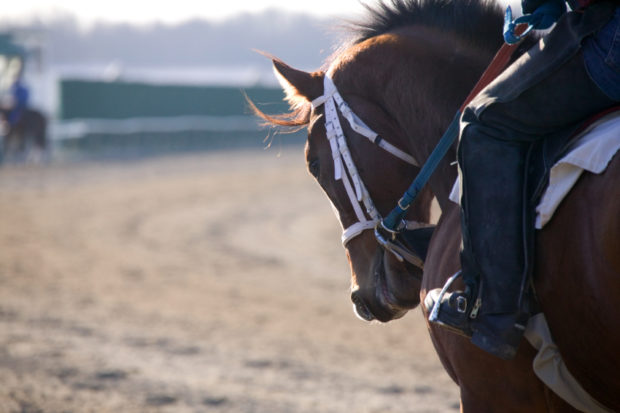
The Horseracing Integrity Act introduced today is a step up from prior versions of the bill, not least because it seeks to bring regulation to all of horse racing and to ban any same-day drugging of horses. Photo by iStockphoto
Two lawmakers from Congressional districts with major horse hoofprints – Reps. Andy Barr, R-Ky., and Paul Tonko, D-N.Y. – introduced legislation to end any doping of Thoroughbreds, Standardbreds, and Quarter horses in the business of pari-mutuel racing. This legislation seeks to launch a new era in the racing industry, which for decades has resisted national standards for the protection of horses and jockeys.
Finally, it seems, there is a critical mass of industry support for enacting policies to end the medicating of horses to enhance performance and to enable injured or otherwise unhealthy horses onto the track. The doping of horses for these disreputable purposes is a contributing factor to breakdowns on the track that kill horses and put jockeys at risk.
The Horseracing Integrity Act (H.R. 2651) is a step up from prior versions of the bill, not least because it seeks to bring regulation to all of horse racing and to ban any same-day drugging of horses. In short, the bill is stronger than ever, and animal advocates and players within the industry who care about the sport and the horses should saddle up and get behind it. The time for excuse-making is over, and people within the industry will be judged on how they respond.
Unlike other sports that have a regulatory body that provides oversight and can sanction those who flout rules and cheat spectators, horse racing has no central governing body. Each state’s racing commission determines what drugs are used and what penalties are meted out for violators. That’s led to a patchwork of 38 different sets of rules, allowing many states to have enormously permissive medication rules and a lax attitude toward the scofflaws.
The federal government regulates gambling involved with tracks through the Interstate Horseracing Act, but to this point, has done nothing to standardize medication rules, leaving bettors, horses, and jockeys at the mercy of unethical trainers who will raise the drug box in order to win. Unscrupulous owners and trainers can juice their horses and shop for racing venues where they can get away with cheating and other unethical behavior.
The bill introduced today would put the U.S. Anti-Doping Agency — a non-profit organization that runs anti-doping programs for U.S. sports, including the U.S. Olympics and the Pan American Games — in charge of a program to set one national uniform set of rules on medication use in horse racing. USADA has demonstrated its integrity time and again, and it’s the right body to oversee this aspect of racing.
The HSUS, the Humane Society Veterinary Medical Association, and The HSUS National Horse Racing Advisory Council are working closely with the Jockey Club, the Water Hay Oats Alliance, and major track owners, jockeys, and trainers to drive this outcome. Within the industry, growing numbers of enthusiasts recognize that horses should be running only with hay, water, and oats in their systems on race day.
“I feel the horse racing industry has an obligation to the horses and to the public to see horses run without medication to ensure the health and safety of both the horses and the jockeys,” stated Frank Stronach, one of the biggest names in American horse racing. The Stronach Group owns Laurel Park and Pimlico Race Course, home of the Preakness Stakes, both in Maryland, the Santa Anita Park racetrack in California, and the Gulfstream Park racetrack in Florida.
Last week I attended the first International Forum for the Aftercare of Racehorses Conference, which attracted people interested in Thoroughbred aftercare and welfare. I spoke to the group and noted that we are seeing reforms in other domains in which animals are used, in food and agriculture, animal testing and science, the use of animals in entertainment, wildlife management, and fashion. No company or industry is exempt from the rules of decency and fair treatment when it comes to taking care of animals, and the racing industry is going to have a comeuppance if it doesn’t right the ship.
The era of routine doping of horses to give the animal an edge in competition must end. We don’t tolerate these abuses in the Olympic games, in cycling, in baseball, or in any other sport. What’s more, the United States is the only major racing jurisdiction in the world that doesn’t ban doping, so our country’s racing industry is an outlier in that respect as well. The Horseracing Integrity Act will go a long way toward getting horse racing back on track and eliminating abuses that have been allowed to put horses and jockeys at risk for too long.
The post Federal legislation introduced to ban doping of horses appeared first on A Humane Nation.
Enviroshop is maintained by dedicated NetSys Interactive Inc. owners & employees who generously contribute their time to maintenance & editing, web design, custom programming, & website hosting for Enviroshop.
